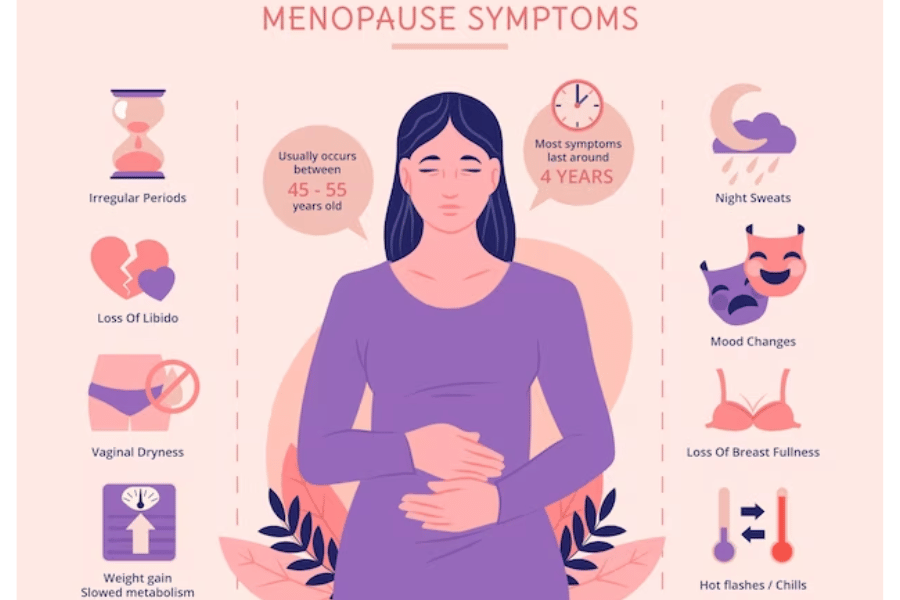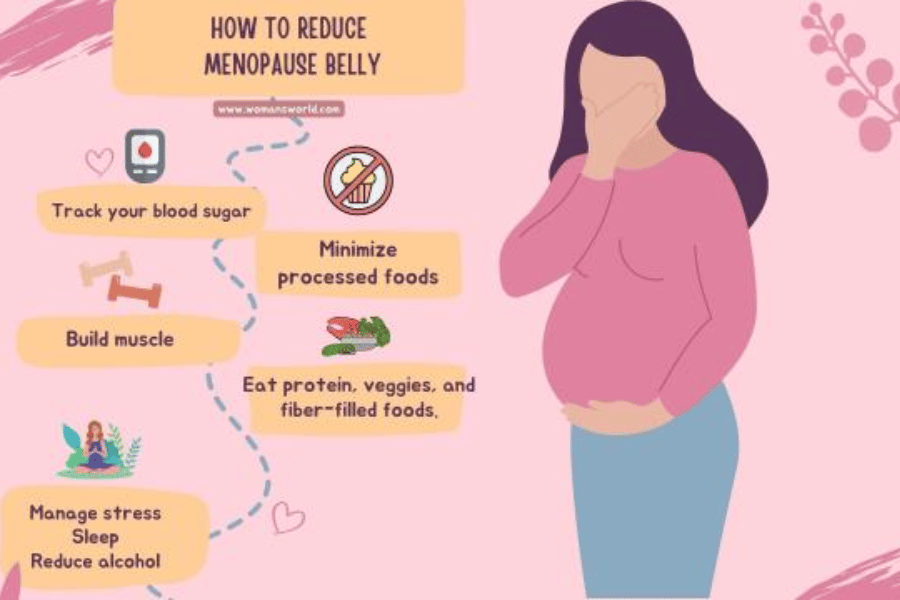Have you ever wondered why weight loss becomes more challenging after menopause? You’re not alone. Many women experience this shift, often leading to frustration and a sense of helplessness. But here’s the good news: Discovering the best diet for post-menopausal weight loss can be a game-changer. This article will delve deep into the seven proven diets that have shown remarkable benefits for women in their post-menopausal phase. So, if you’re on the lookout for effective strategies to shed those extra pounds, you’re in the right place. Let’s embark on this enlightening journey together.

best diet for post menopausal weight loss
The Menopausal Transition: Why Weight Management Becomes a Concern
Menopause, a natural phase in every woman’s life, often brings about significant hormonal changes. These shifts, particularly the decline in estrogen levels, can have a profound impact on metabolism, leading to weight gain. It’s not just about the numbers on the scale; it’s about how the body changes its fat distribution, often accumulating more around the abdomen.
A common misconception is that weight gain during the post-menopausal phase is solely due to aging. While aging can play a role, the hormonal imbalances during menopause are the primary culprits. This is where the importance of finding the best diet for post-menopausal weight loss comes into play. With the right dietary approach, women can combat these changes and maintain a healthy weight.
Moreover, it’s essential to understand that every woman’s body is unique. What works for one might not work for another. Hence, it’s crucial to be informed and choose a diet tailored to individual needs, ensuring optimal health and well-being during this transition.

best diet for post menopausal weight loss
Answering the Question: What are the Best Diets for Post Menopausal Weight Loss?
Navigating through the maze of diets can be daunting, especially when you’re looking for something tailored to the unique challenges post-menopausal women face. Let’s dive into some of the most effective diets backed by science and expert opinions.
Weight gain after menopause is a common concern for many women due to changes in hormone levels, metabolism, and lifestyle. Here are seven dietary approaches, along with their benefits, that can be helpful for post-menopausal weight loss:
- Mediterranean Diet
- Benefits:
- Reduces the risk of heart disease, stroke, and diabetes.
- Rich in monounsaturated fats from sources like olive oil and nuts.
- Packed with antioxidants from fruits, vegetables, and whole grains.
- Encourages moderate wine consumption, which can be beneficial for heart health.
- Benefits:
- Low-Carbohydrate Diet
- Benefits:
- Can result in quick initial weight loss.
- Helps in managing blood sugar and insulin levels.
- Can lead to reduced hunger and calorie intake.
- Benefits:
- DASH Diet (Dietary Approaches to Stop Hypertension)
- Benefits:
- Lowers blood pressure.
- Low in sodium, rich in potassium.
- Focused on whole foods, lean proteins, and healthy fats.
- Benefits:
- Plant-Based or Vegetarian Diet
- Benefits:
- Lowered risk of chronic diseases like heart disease and diabetes.
- Helps in maintaining a healthy weight due to lower calorie intake.
- Environmentally friendly and sustainable.
- Benefits:
- Intermittent Fasting
- Benefits:
- May increase metabolic rate.
- Reduces calorie intake without needing to consciously count calories.
- Potential benefits for cellular health and longevity.
- Benefits:
- Paleo Diet
- Benefits:
- Eliminates processed foods, leading to improved diet quality.
- Can lead to weight loss due to reduced carbohydrate intake.
- Emphasizes lean proteins, vegetables, and healthy fats.
- Benefits:
- Volumetrics Diet
- Benefits:
- Focuses on foods that have low energy density, allowing you to eat larger volumes for fewer calories.
- Encourages intake of water-rich foods like fruits, vegetables, and soups.
- Helps you feel full and satisfied.
- Benefits:
When choosing a diet, it’s essential to consider individual preferences, health conditions, and lifestyle. Working with a nutritionist or healthcare provider can help tailor the diet to personal needs. Additionally, any effective weight loss strategy should be combined with regular physical activity, stress management, and adequate sleep.
Solutions: How to Implement These Diets Effectively
Embarking on a weight loss journey, especially during the post-menopausal phase, requires more than just knowledge. It’s about practical implementation. Here’s how you can effectively incorporate these diets into your lifestyle:
1 Tips for Starting the Mediterranean Diet
- Begin with Whole Foods: Focus on fresh fruits, vegetables, whole grains, and lean proteins. Processed foods, high in sugars and unhealthy fats, are a no-go.
- Incorporate Healthy Fats: Olive oil and nuts are staples. They not only enhance flavor but also provide essential fatty acids beneficial for heart health.
- Stay Hydrated: Drink plenty of water, and occasionally enjoy a glass of red wine, known for its heart-healthy resveratrol.
2 Overcoming Challenges When Adopting a Low-Carb Diet
- Plan Ahead: Meal planning can be a lifesaver. It ensures you have the right foods on hand and reduces the temptation of carb-heavy snacks.
- Understand ‘Net Carbs’: Focus on net carbs (total carbs minus fiber) as fiber is essential for digestive health.
- Seek Support: Join online communities or local groups that focus on low-carb lifestyles. Sharing experiences and recipes can make the journey smoother.
3 Best Practices for Intermittent Fasting
- Choose a Suitable Window: Whether it’s the 16/8 method or alternate-day fasting, select a window that aligns with your lifestyle.
- Stay Hydrated: During fasting hours, water, black coffee, and tea (without sugar or milk) can help curb hunger pangs.
- Listen to Your Body: If you feel dizzy or overly fatigued, it might be a sign to re-evaluate your fasting window or intake during eating periods.
Remember, the best diet for post-menopausal weight loss is the one that aligns with your personal needs and is sustainable in the long run. Always consult with a healthcare professional before making significant changes to your diet.

best diet for post menopausal weight loss
Conclusion
Navigating the challenges of post-menopausal weight loss can be daunting, but with the right dietary approach, it’s entirely achievable. The diets discussed in this article are not just fads; they are backed by science and have been proven to be effective for many women in the post-menopausal phase. Your journey to post-menopausal weight loss starts with the right diet. Embrace these proven strategies and witness their transformative benefits. In essence, post-menopausal weight loss is not just about shedding pounds; it’s about embracing a healthier lifestyle that ensures long-term well-being.
Understanding Post-Menopausal Weight Loss: Common Queries Answered
Q: How do hormonal changes during menopause impact weight? A: Menopause is marked by a decline in estrogen levels, which can lead to a slower metabolism. This, in turn, can result in weight gain. Additionally, these hormonal shifts can influence where the body stores fat, often leading to an increased accumulation around the abdomen.
Q: What makes the Mediterranean Diet suitable for post-menopausal women? A: The Mediterranean Diet is rich in healthy fats, lean proteins, and whole grains. It emphasizes foods that can help balance hormones, reduce inflammation, and promote heart health – all of which are crucial considerations for post-menopausal women.
Q: Are there specific risks associated with a Low-Carb Diet for post-menopausal women? A: While a Low-Carb Diet can be effective for weight loss, post-menopausal women should ensure they’re getting enough nutrients, especially calcium and vitamin D, to support bone health. It’s always recommended to consult with a nutritionist or healthcare provider before making significant dietary changes.
Q: How does Intermittent Fasting work, and why might it benefit post-menopausal women? A: Intermittent Fasting involves cycling between periods of eating and fasting. It can help regulate blood sugar levels, improve metabolic health, and promote weight loss. For post-menopausal women, it might also aid in hormone balance. However, it’s essential to approach it with caution and under professional guidance.
Q: Can exercise complement the “best diet for post-menopausal weight loss”? A: Absolutely! Exercise, especially strength training, can help counteract muscle loss associated with aging. It also boosts metabolism and works in tandem with a balanced diet to promote healthy weight loss and overall well-being for post-menopausal women.